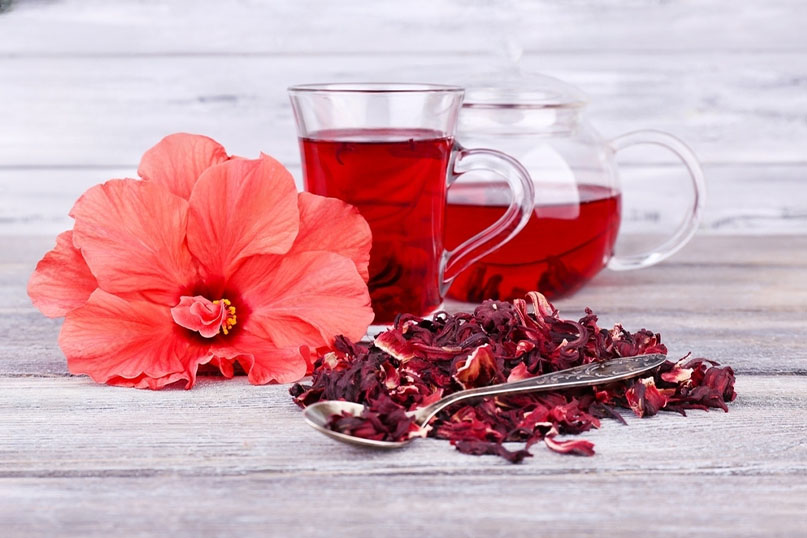Hibiscus for blood pressure

Table of Contents
Hibiscus, known for its lively colours and distinctive floral aroma, is not only a fantastic uplifter of mood but can also be a medication for treating hypertension (high blood pressure problems). In recent years, researchers have studied these amazing plants’ rich medical properties, especially the relation between hibiscus tea and blood pressure. Let’s delve into the world of hibiscus for blood pressure and look at its potential medical benefits.
Exploring the Benefits of Hibiscus
The antioxidants found in hibiscus boost the body cells’ defense power and help control the damage caused by free radicals. Moreover, its anti-inflammatory action helps reduce swellings, opening the way for a healthy body. Hibiscus has also been shown to provide cardiovascular benefits such as relaxing the veins, encouraging circulation, and lowering blood pressure. While drinking hibiscus tea can be misconstrued as just being a tasty affair, it is also an affordable aid to your well-being that keeps your heart happy.
The Role of Hibiscus in Blood Pressure Management
Hibiscus tea made with the dried sepals of hibiscus can help tremendously in managing hypertension. Studies have proven that this tea reduces high blood pressure, especially in people who are most susceptible to it.
What is the mechanism behind this connection between hibiscus tea and blood pressure? Hibiscus is packed with some extraordinary compounds known as polyphenols that can be rightly called “the molecular superheroes” in our bodies. These polyphenols have antioxidant properties that allow them to fight free radicals, the harmful molecules in our cells.
However, hibiscus for blood pressure is also recommended specifically as it has been indicated to have a calming effect on blood vessels by making them dilate and facilitating the free flow of blood. Thus, by consuming hibiscus tea every day, you can naturally lower your base blood pressure over time.
Research Evidence on Hibiscus and Blood Pressure
Researchers discovered that hibiscus tea varieties, especially sour tea, have the potential to control blood pressure. Numerous studies show that consuming hibiscus tea daily is associated with decreased diastolic and systolic blood pressure levels, with the peak effect observed in individuals with stage 1 hypertension.
The hibiscus plants have antioxidants and anthocyanins, which are beneficial compounds. The latter is known to promote heart health and improve blood vessel function. Especially noteworthy are the antioxidants known as as anthocyanins which can help prevent the oxidation of “bad” cholesterol, thus reducing the risk of heart disease. Moreover, hibiscus can kick-start the release of nitric oxide in the body, which results in better blood flow and reduced blood pressure.
FAQs
1. Can hibiscus interact with blood pressure medications?
Although hibiscus is usually considered safe for the majority of people, it is crucial to seek professional advice from your healthcare provider, particularly if you’re taking medicine for high blood pressure or any other condition. A few components of hibiscus can sometimes interfere with certain medications and, therefore, affect the way they work or cause side effects.
2. Is hibiscus safe for pregnant or breastfeeding women?
Pregnant or breastfeeding women should be careful in the intake of hibiscus because, so far, there is limited information about its safety in these conditions. On a precautionary note, a mother-to-be should seek counsel from medical personnel before she starts taking hibiscus during pregnancy or while breastfeeding.
3. How much hibiscus tea should I drink to lower my blood pressure?
The answer to this problem is not uniform. Each person reacts to hibiscus differently. It is a good idea to start with a lower dose and then proceed with an increasing dose, monitoring your blood pressure levels and any unwanted side effects.
4. Is hibiscus tea effective for lowering blood pressure?
Studies indicate that hibiscus tea may decrease blood pressure by a small amount, but this can vary between people. Variables, such as the number of dosages, the frequency of intake, and the general mode of life, may influence the final results. It is good to drink hibiscus as often as possible while combining it with a balanced diet and regular exercise routine.
Conclusion
Taking hibiscus for blood pressure regularly can make a difference for individuals with hypertension. With its antioxidant, anti-inflammatory, and blood pressure-lowering properties, the hibiscus can be regarded as a natural partner in the fight against heart diseases. But it’s important to apply hibiscus intake wisely, ask for expert guidance, and not replace other ways for cardiovascular wellness with it.
Sources –
https://www.ncbi.nlm.nih.gov/pmc/articles/PMC6621350/
Disclaimer – This article is for information purpose only. Always consult your doctor in case of any blood pressure or other health-related problems.
Disclaimer
The information contained in this article is to educate, spread awareness in relation to hypertension and other diseases to the public at large. The contents of this article are created and developed by BPinControl.in through its authors, which has necessary, authorisations, license, approvals, permits etc to allow usage of this articles on The Website. The views and opinions expressed in this article are views, opinions of the respective authors and are independently endorsed by doctors. Although great care has been taken in compiling and checking the information in this article, The Website shall not be responsible, or in any way liable for any errors, omissions or inaccuracies in this article whether arising from negligence or otherwise, or for any consequences arising therefrom. The content of this article is not a substitute for any medical advice. The Website shall not be held responsible or liable for any consequence arising out of reliance on the information provided in the article.


Comments (0)
No comments found.Add your comment